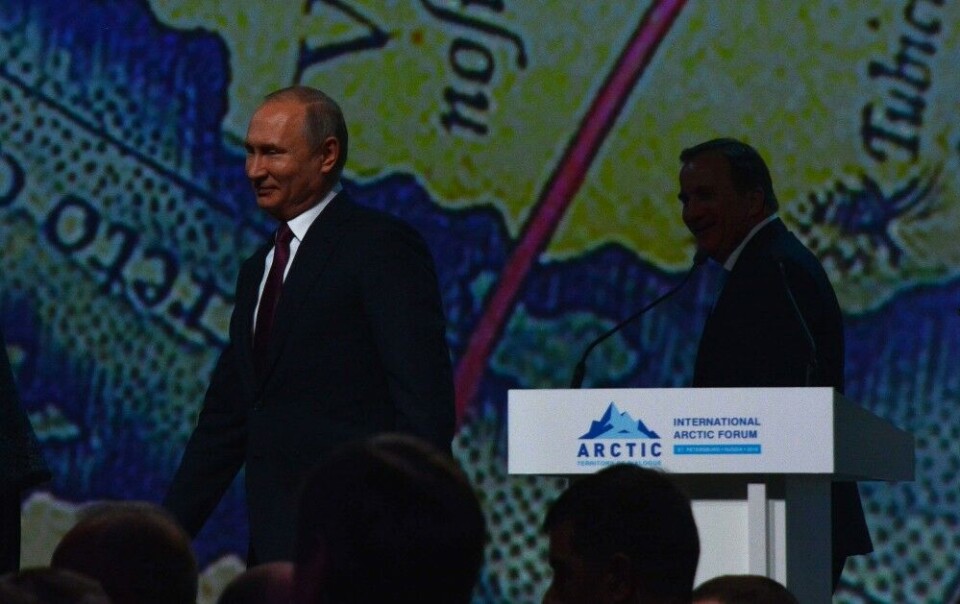
Putin's grand plan for Arctic shipping might wreck in Barents Sea
Government turns down a proposed territorial extension of the Northern Sea Route. The President's ambitious target for Arctic shipping is unlikely to be reached unless the Barents Sea is included, route developers argue.
The Northern Sea Route (NSR) was again on the agenda as Russia’s Arctic Commission last week convened to discuss key developments in the country’s North. The development of the shipping route has been top priority in the country ever since President Putin included it in his so-called May Decrees in 2018.
Putin wants annual shipments on the far northern connection between Europe and Asia to reach 80 million by year 2024 and government officials have now for two years grappled with the task.
In 2017, a total of 10,7 million tons were transported on the route. In 2018, the volume increased to 20,18 million tons and in 2019 to 31,5 million.
But despite plans for a number of major new industrial projects across the region, the road towards 80 million tons is still very long and difficult.
The Northern Sea Route covers the waters between archipelago Novaya Zemlya and the Bering Strait
No route extension
In an ingenious bid to inflate volumes, several government representatives have recently proposed to extend the range of the Northern Sea Route to the Barents Sea. If including the seaports of Murmansk and Arkhangelsk in the NSR, the 80 million ton limit would easily be within reach, they argue.
However, the participants in last week’s Arctic Commission meeting decided otherwise.
According to newspaper RBC, the Arctic Commission will not extend the territory of the sea route neither in the west, nor in the east. The reason is that an extension will have to be followed by legal changes in the status of the route, the newspaper reports.
Currently, Russia stands free to introduce special regulations on shipping in the area because of the complex situation with sea-ice. If those regulations were to apply also in the Barents Sea, conflicting situations over international maritime laws could appear, skeptics say.
It is especially Rosatom, the state nuclear power company with special responsibilities for NSR development, that oppose the extension of the sea route, RBC reports with reference to several ministry sources.
“Within reach”
Despite the seemingly impossible task, Rosatom still argues that 80 million tons of shipments can be reached by 2024. In a meeting with President Putin on 17th June, Rosatom leader Aleksey Likhachev underlined that shipping on the sea route is progressing ahead of schedule.
“We are moving towards this goal, advancing ahead of the annual target volumes,” Aleksey Likhachev said and added that goods volumes in 2019 was 5,5 million tons higher than originally planned.
According to the company leader, it is first of all new oil and gas fields that will help boost shipments,
“It is a very ambitious number - 80 million […] But we are very actively working with mineral extracting companies Rosneft, Novatek, Gazprom, and see how our partners invest efforts and finances in these northern fields,” Likhachev told the president.
The Rosatom leader has previously made clear that he believes shipments on the NSR can reach 92,6 million tons by 2024. A key part of that volume is coal, Likhachev explained in a conference on the Arctic in 2019.
Putin not updated
Rosatom and the other state bodies engaged in the development of Arctic shipping are under major pressure to meet targets.
However, in last week’s meeting in the Kremlin, it was the president that appeared out of track on developments.
In the meeting, Putin asked Likhachev whether 30 million tons of shipments would be reached in the course of 2030. The President appeared to pretend he did not know that the 30 million ton limit was crossed already in 2019.
According to Putin, the original plan for the NSR includes more than 30 million tons only in year 2021.
Likhachev responded only shortly.
“I believe we will cross that limit,” he told the president
















